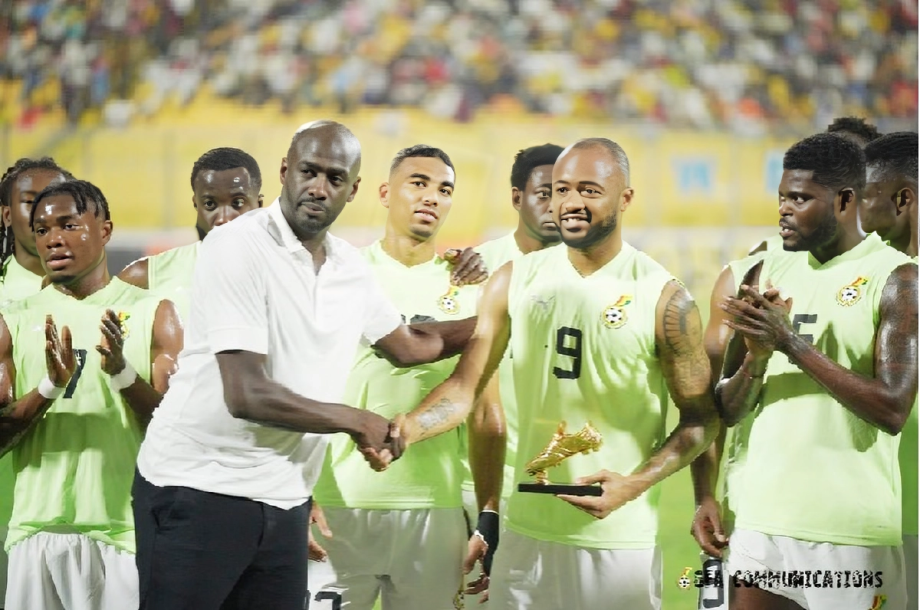Christopher Sededzi Kwame Writes: Black Stars at a Crossroads - Otto Addo’s tactics and the fading glory of Ghana’s World Cup dream

GH News Media

Football is not just a sport in Ghana; it is the nation’s soul, its pulse, its poetry.
From the golden chants that echo through the streets during a World Cup to the quiet heartbreak of another wasted chance, the Black Stars carry the weight of a people’s hope on their shoulders.
And yet, under Otto Addo, the team once again stumbles to a 1-1 draw with Chad in a must-win qualifier that has left millions questioning: can this team still rise to the promised land?
From Berlin 2006 to Today: The Journey of Hope and Decline
When Ghana first qualified for the World Cup in 2006, the country erupted with joy. That generation, led by Stephen Appiah, Michael Essien, Sulley Muntari, and a fearless young Asamoah Gyan, didn’t just play football; they embodied patriotism.
They were debutants, but they played with the audacity of veterans, shocking the world by reaching the Round of 16 in Germany.
Then came 2010, the year Africa hosted its first-ever World Cup. Ghana, with a squad full of warriors, marched all the way to the quarter-finals, the closest any African side has come to the semi-finals.
Read Also: Chad 1-1 Ghana: Black Stars player ratings after late World Cup qualifier blow
The name Luis Suárez still lingers like a scar, his infamous handball denying Ghana a historic breakthrough. Yet, that squad showed something today’s Black Stars lack: heart, hunger, and identity.
Fast forward to 2022 in Qatar. Ghana returned to the global stage, but instead of glory, the world saw a timid, fragmented team, a side unsure of itself, a shadow of the Black Stars that once terrified giants. That downward spiral has now spilt into the 2026 World Cup qualifiers.
Chad Draw: A Symptom of Deeper Illness
The game against Chad was meant to be a statement. Leading Group I with 15 points, Ghana had the chance to cement control. And when Jordan Ayew finished off a Kudus assist in the 17th minute, fans felt the familiar spark of hope.
But football is unforgiving; a game is never won on paper or in moments; it is won in attitude, in intensity, and in how a team kills off an opponent.
Instead, Ghana sat back. Instead of pressing for a second, they drifted. Instead of dictating tempo, they surrendered initiative. And like all timid teams, they were punished by Chad’s Celestin Ecua striking late, piercing Ghanaian hearts.
It wasn’t just a draw. It was a reminder that this team, under Otto Addo, lacks tactical clarity, urgency, and the fighting spirit of old.
Where Is the Fire?
Ask any Ghanaian what made the Black Stars of old special, and the answer is simple: commitment. Mubarak Wakaso was playing like every tackle was life or death. Michael Essien covering every blade of grass. Asamoah Gyan running into the channels with blood in his eyes. Prime André Ayew, chest thumping, pulling teammates along by sheer force of will.
This current generation? Their talent is undeniable. Kudus is world-class. Inaki Williams is a striker with pedigree.
Antoine Semenyo has power and flair. Yet talent without urgency is nothing. Against Chad, the Black Stars looked like they were sparring in a friendly way, not fighting for World Cup destiny.
Otto Addo’s Tactics: Lost at Sea
Coaches define teams. Milovan Rajevac in 2010 created a compact, disciplined unit that could absorb pressure and strike with precision. Kwesi Appiah’s first stint brought belief in attacking fluidity.
But Otto Addo? After 15 games in charge (5 wins, 5 draws, 5 defeats), his Black Stars remain an enigma.
There is no clear system. The midfield is a ghost, neither creative nor combative. Salis Samed fades when leadership is needed. Gideon Mensah struggles to impose himself. Inaki Williams remains isolated, a Ferrari left in traffic with no road to run on. Even Semenyo, who hustles with intensity, looks tactically abandoned.
Otto Addo’s philosophy seems rooted in survival, not ambition. He defends when he should attack and retreats when he should advance. The result? Ghana plays football without identity, without courage, without joy.
Goalkeeper Debate: Fair or Misplaced?
In moments of frustration, fans often find scapegoats. Recently, goalkeeper Benjamin Asare has taken fire. But truth be told, his saves have kept Ghana alive more times than they have cost the team. The Chad equaliser? A cruel deflection that would beat even Thibaut Courtois. Goalkeepers can only do so much when defenders switch off.
The real blame lies not in the goal but in a lack of defensive structure, poor anticipation, and failure to close down shots.
Monday Against Mali: A Defining Night
Now, Ghana faces Mali at the Accra Sports Stadium. And make no mistake — this isn’t just a qualifier. It’s a referendum on Otto Addo, on this team, on whether the Black Stars still command fear or have become just another African side fighting for scraps.
For Ghanaians, the World Cup is not optional. It is oxygen. It is culture. It is pride. Every qualification campaign is a pilgrimage, every victory a passport, every goal a national anthem. The slogan remains etched in every fan’s heart: “Your win is our visa.”
Otto Addo must understand this weight. Failure to beat Mali, failure to inspire a fight, failure to bring tactical clarity, and his tenure may rightfully be declared over.
The Black Stars are not just any team. They are four-time African champions, quarter-finalists on the world stage, and the pride of West Africa.
To see them play with timidity is an insult to history, to legends, to fans who live and die with every kick.
Ghana does not demand perfection. Ghana demands passion. The Black Stars jersey is not just fabric; it is history, sweat, sacrifice, and identity. Players must wear it like armour, not a costume. Coaches must lead with conviction, not confusion.
Because in Ghana, football is not entertainment. It is nationhood. It is dignity. And the Black Stars, whether Otto Addo likes it or not, must rise again.



